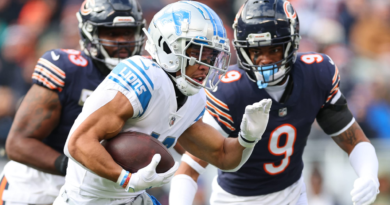How Eliud Kipchoge keeps Boston Marathon setback in mind amid historic run
Over the last decade, Eliud Kipchoge has won 15 marathons. The long-distance runner from Kenya has set the marathon world record twice, won Olympic gold twice, and in 2019 he became the only person in history to record the race’s 26.2 miles in under two hours, albeit during an experimental run that did not come during an open competition. As if those accomplishments weren’t impressive enough, he’s also lost just three times in that span.
It is precisely why his sixth-place finish at Monday’s Boston Marathon was, for all intents and purposes, so unexpected for the 38-year-old Kipchoge, who has won four of the sport’s six World Marathon Majors. Still, the result was a reminder that important challenges lie ahead as he continues building a marathon career already considered one of the best of all time.
“Running has a lot of challenges, and you know the marathon is like life,” Kipchoge told ESPN the day after his first Boston Marathon. “Life has ups and downs all the time, so what I meant was that yesterday [Monday] was a challenge where I couldn’t push like I’m used to. But we slept, we woke up and we live to fight another day.”
The experience of coming off a marathon with anything other than a win is somewhat alien for Kipchoge, yet allowing the emotion of such a result to linger for long is even more of a rarity. For now, his focus is on recovery and spending time with family, but ultimately it will turn to returning to the winner’s circle as soon as possible.
Hilly terrain and cold, damp weather combined with what he deemed a left leg problem ultimately derailed Kipchoge’s bid for a win in his fifth different World Marathon Major race. Fellow Kenyan Evans Chebet won Monday for the second consecutive year, and Kipchoge finished sixth with a time of 2:09:23 — his slowest marathon time ever.
“I couldn’t push like I’m used to,” Kipchoge said. “I can just say; actually, it was not my day.”
Given the benefit of a 24-hour buffer after his finish, Kipchoge seemed unflappable once more. He joked about turning to his favorite song, Kelly Clarkson’s “Stronger” as a way to bounce back quickly from any post-race blues.
“I had to listen to the song yesterday because … the Boston Marathon didn’t kill me, it made me stronger. I’ll come back stronger after I recover,” he said.
November’s New York City Marathon looms as the next unconquered major for Kipchoge, though he was mum on whether the race would be his next target. Rather, he reiterated his commitment to preparing appropriately for the next challenge.
Kipchoge, who trained about five months for Boston, is known to employ a a meticulous daily regimen that sees him run more than 130 miles per week. He sidesteps injury for the most part with his “80/20” training technique in which roughly four out of every five practice runs are completed at low intensity. He charts every run manually with a training log and diary, noting not just times, distances and aches but happiness levels during each session.
On a more high-tech level, the data collection is supported with help from COROS, a company specializing in performance-focused GPS sports wearables. Kipchoge’s watch offers him advanced metrics such as his stride ratio, ground contact time, power, balance and stride height. It also has the capability to score a marathon from zero to 100 — with the max score based off his sub-two hour run.
Kipchoge has worked with coach Patrick Sang and teammates at NN Running Team to polish his technique, resulting in a successful transition to marathons after competing mostly at the 5,000 meter distance for the first decade of his career.
“When you see an athlete like Eliud grow from a teenager with talent to a world record holder, well, I cannot even find the words to describe that satisfaction,” Sang said in a 2019 interview.
After dominating his first trio of World Marathon Majors in Berlin, Chicago and London between 2014 and 2015 — establishing records along the way — Kipchoge has now begun his march on the back half. In 2021, he won in his first Tokyo Marathon, setting the race record with a time of 2:02:40.
Though he missed out on winning Boston, there’s still a chance for him to arrive at the doorstep of the 2024 Olympic Games in Paris with all six majors under his belt if he races and wins in New York later this fall.
In this scenario, winning an unprecedented third Olympic gold medal would be the cherry on top of an unassailable career resume, one cementing his status as one of the greats of distance running.
“To be in the Olympics next year and win, would be historic,” Kipchoge said. “No human being has won the marathon in the Olympics three times. I will try to win in Paris 2024 and then see what’s next.”
There are signs indicating Kipchoge will bounce back sooner rather than later. After finishing eighth at the 2020 London Marathon — his lowest finish to date — Kipchoge won his next four races, including the 2020 Olympic gold medal in Tokyo in which his 80-second margin of victory was the largest since 1972. In the 2022 Berlin Marathon, the race directly preceding this year’s Boston Marathon, he set his most recent world record with a blistering 2:01:09.
For now, Kipchoge will return to Kenya to be among loved ones, analyzing what went wrong in Boston while deciding what to do next. In discussing most aspects of his preparation and performance, Kipchoge will often say “we” when he could just as easily say “I,” a nod to his bond with Sang and his teammates. Triumphs are shared, as are defeats.
“It affects when you think of the time — the weeks, the months of training and sacrifice. We came together for five months [for Boston],” Kipchoge said. “It’s disappointing and discouraging, but this sport has its own challenges.”
Surely, Boston has not seen the last of Kipchoge as long as his quest to win all six majors goes unfulfilled. However, there is opportunity to reflect in defeat.
Kipchoge lends his personal mantra to the title of his memoir “No Human is Limited,” and that philosophy comes up often. It is the perfect antidote to suggest he will not complete any of his career goals.
“Marathon is life. You can have a lot of bumps on the way, which happened yesterday, but all in all, let us push together,” Kipchoge said.
“It’s good to win. But it’s great to finish.”




